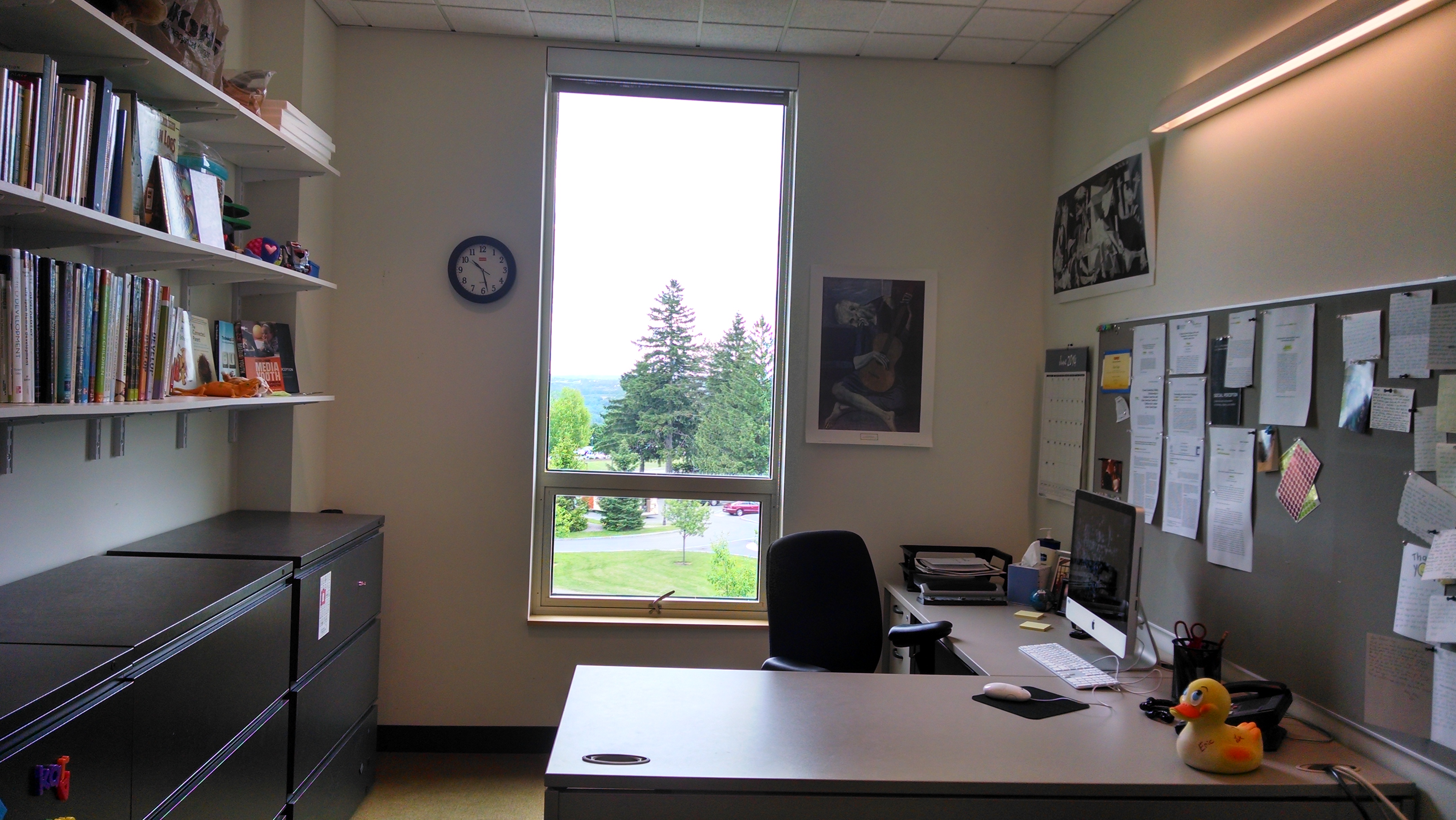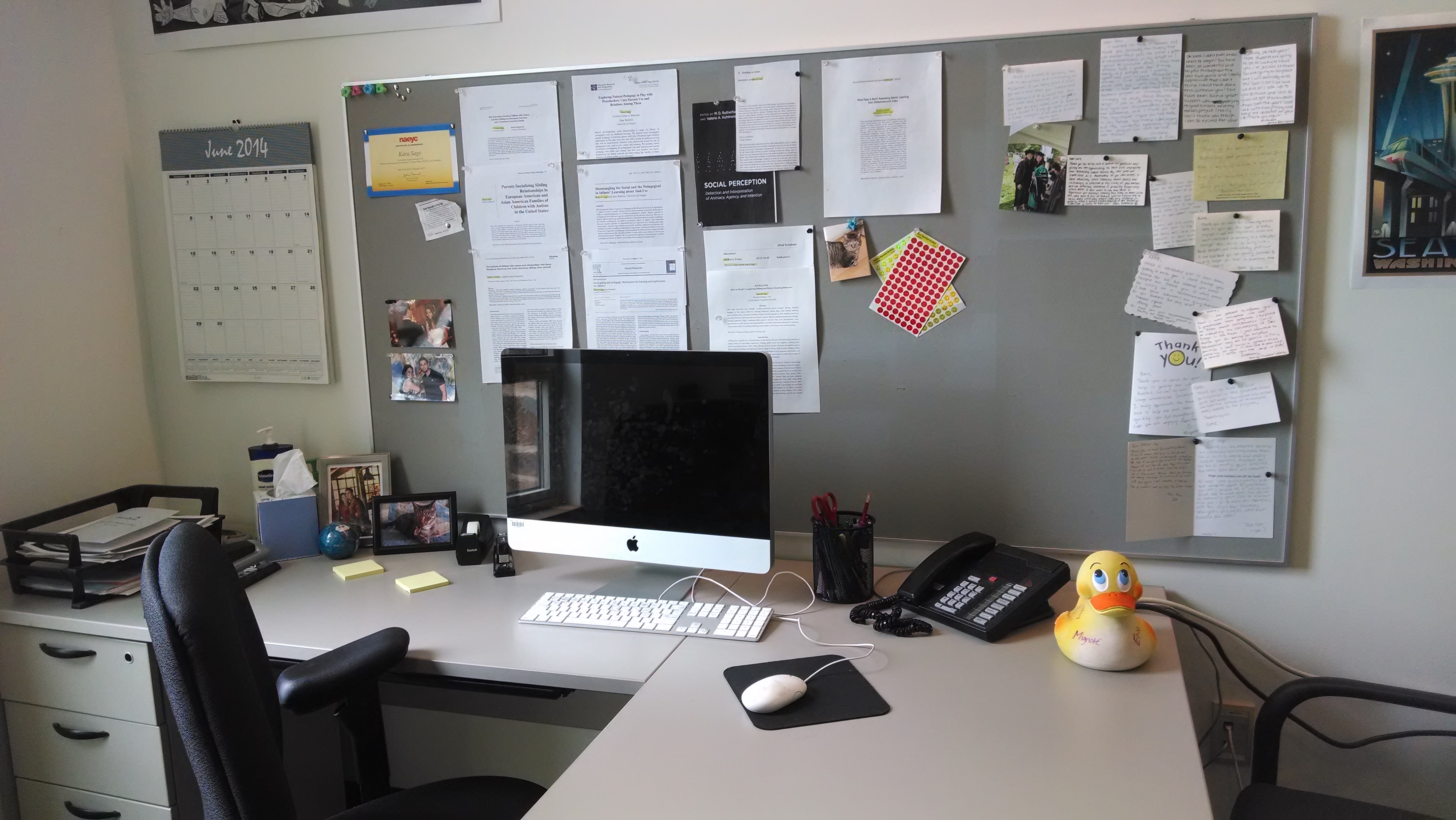 School name: Hamilton College
School name: Hamilton College
Type of college/university: Liberal Arts College (~1800 students)
School locale: small town – in the quaint village of Clinton, NY
Courses I teach: Introduction to Psychology, Child Development, Educational Psychology, Lifespan Development, Statistics for Psychology, Cognitive Development, specialty course called “Psychology, Children, Media, and Technology”, Collaborative Research, Senior Project
What’s the best advice about teaching you’ve ever received?
The best advice I’ve received is to just be myself when teaching, especially on the first day of class when you are establishing a rapport with a new batch of students. Talk openly and have a conversation. Make the students feel that you are talking with them and not just at them. On a similar thread, during the term, make the class your own – Intro Psychology a la Kara Sage. Even if great ideas can come from outside your own mind, always try to put your own unique spin on the topics to make your class memorable.
What book or article has shaped your work as a psychology teacher?
For teaching activities, I’ve consulted Favorite Activities for the Teaching of Psychology, edited by Ludy T. Benjamin, Jr. and published by APA. That book offered some creative ideas to increase the interactivity of Introductory Psychology in particular. I also recently read Alone Together: Why We Expect More from Technology and Less from Each Other by Sherry Turkle and had this as an assigned book for my class this past spring semester (Psychology, Children, Media, and Technology). The book was extremely timely and thought-provoking, focusing on how engrained technology is in our lives; it led to many interesting and reflective conversations with students. Lastly, an article by Sana, Weston, and Cepeda (2013) has influenced my classroom policies on technology use – Laptop multitasking hinders classroom learning for both users and nearby peers. It often surprises students to read and discuss how technology use in class might be distracting for not just themselves, if they are tempted to flip to that Facebook page for a moment, but also affects the learning of others around them. I’ve been trying out different course rules around technology use, and having students read this article at the start of the term led to a great understanding of why we might opt out of students utilizing technology in class, especially given the prevalence of media multitasking.
Tell us about your favorite lecture topic or course to teach.
My favorite course to teach is "Psychology, Children, Media, and Technology" - a specialty course that encompasses aspects of many parts of psychology from developmental to social psychology, and most certainly the up-and-coming sub-discipline of media psychology. Discussing how pervasive technology is in our lives and the lives of Generation M (aka today's children) is such a relevant topic that fascinates both me and my students and also encourages skepticism since this a relatively new area of research. We spend most classes critically discussing recent research into such media and technologies as Facebook, virtual worlds, online gaming, television, and video games and the related effects on the person, from body image to self-esteem to friendships. There are a lot of anecdotes and thinking about how Generation M will grow up differently given that they are saturated with technology. There are also many discussions that borderline on the philosophical, such as if AI systems can ever be, or ever should be, considered human.
Describe a favorite in-class activity or assignment.
A favorite in-class activity for Introductory Psychology is one titled Be the Neurologist. To help students learn about the various brain parts and their functions, they receive a list of brain areas and what behavior might be awry should that area have a lesion – for instance, touch sensitivity would be off if there was damage to the somatosensory cortex. Students are paired off and take turns being the patient (selecting one lesion) and the neurologist (conducting behavioral tests until they have enough evidence to substantiate a diagnosis). There is a lot of fun and laughter along with learning that comes with this activity, as the patient role plays the appropriate behavior and thus might showcase deficits in walking, talking, etc.
What teaching and learning techniques work best for you?
Over the years, I have determined that different techniques work better for different classes and that flexibility given a particular semester’s students is key. For Introductory Psychology, I blend some lecturing with interactive activities and videos to bring the content to life. An important goal is to establish that psychology is a science. The audience is typically freshmen with a handful of sophomores. For a topical course like Child Development, generally with a blend of upperclassmen enrolled, there is more discussion and reading of empirical literature for us to discuss. It is also interesting to focus on parenting and what lessons I can impart in that regard. For these courses that focus on development and education, including Child Development and Educational Psychology, an important learning technique is to offer hands-on experience with children. I have my students volunteer hours at a local daycare or school so that they can see “development in action” and we can discuss how the concepts from the course translate. Lastly, for a specialty course in an emerging field, like my Psychology, Children, Media, and Technology course, I utilize a discussion-heavy format where most class sessions are us (~20 students and myself) sitting in a circle and critically thinking through what the material for the day has to offer on our topic and extending that material with anecdotes, examples, and reflections.
 What’s your workspace like?
What’s your workspace like?
Surprisingly neat and tidy! I am a very organized person, and I extend that to my workspace. I feel that it makes me more productive with getting tasks, like grading and reading, completed in a timely fashion. When I’m there, there is most often a large receptacle of coffee on my desk as well and perhaps a rubber duck or two (which I give out as prizes to kids who come into my lab and sometimes even my students). My bulletin board has a blend of personal and academic postings – from pictures of my honeymoon to printed copies of my publications.
Three words that best describe your teaching style.
Energetic, passionate, collaborative
What is your teaching philosophy in 8 words or fewer?
Be yourself; Foster passion and critical/scientific thought
Tell us about a teaching disaster (or embarrassment) you’ve had.
I think the biggest disappointments come when I’ve put a lot of effort into developing a particular activity and it doesn’t seem to fly with a particular class, even if it worked well with other classes. I try out many interactive activities with my Introductory Psychology class in particular, and there is always at least one flop every semester that can be a bit of a downer.
What is something your students would be surprised to learn about you?
My students might be surprised to learn that I am a Zumba fanatic and have a secret aspiration to be a certified Zumba instructor. A perfect activity for de-stressing and just having fun!
What are you currently reading for pleasure?
Based on a student’s recommendation, I am currently reading Ready Player One by Ernest Cline. It presents one image of where technology could go in the future, and is an exciting and intriguing read.
What tech tool could you not live without?
YouTube! In all of my classes, video clips are used as examples to bring concepts to life – let’s see babies babbling or cognitive behavioral therapy in action. The videos can really lift words off the pages of the textbook to illustrate concepts well.
What’s your hallway chatter like? What do you talk to colleagues about most (whether or not it is related to teaching/school)?
Students are very frequently in my office space and in my colleagues’ spaces, so there is much discussion about their busy schedules, lives in general, and whether or not they are going to challenge me to a game of Settlers of Catan. There are discussions of random teaching ideas that ensue between my colleagues and myself. With one of my colleagues in my office ‘pod’, we sometimes sit at a little table with some treats and chat about academic and non-academic topics when the day is particularly stressful for whatever reason – helps us both unwind!
